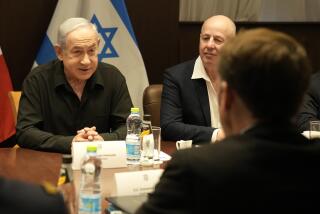Peres’ Campaign Chief Faces Difficult Task
- Share via
TEL AVIV — With Hezbollah rockets falling on northern Israel and the threat of Hamas suicide bombers hanging over the country, Foreign Minister Ehud Barak is in the seemingly unenviable position of managing the election campaign of Prime Minister Shimon Peres.
But casting aside grim warnings from political observers that one more deadly explosion could kill Peres’ election bid, Barak is confident--with less than seven weeks to go before the May 29 vote--that the prime minister’s five- to six-point lead over Likud candidate Benjamin Netanyahu will hold.
“The Israeli public understands the reality that terrorism is a nonpartisan issue, that the victims come from all parties,” Barak said in an interview at his Tel Aviv office.
“They know those who are fighting terrorism are nonpartisan [military] men who have spent their lives fighting terrorism and that Likud has no captain or general in reserve who can do it better by any standard,” he said. “The difference is whether you are leading the country toward a dead end politically or trying to create a way out of this tunnel.”
A retired army general who is new to the game of politics, Barak is, nonetheless, aware that he is promoting a 72-year-old candidate with a strong vision of a new Middle East at peace--a way out of the tunnel--but a weak public persona.
Peres is one of the authors of the 1993 Israeli-Palestinian peace agreement and has been pushing for an accord with Syria. After the latest wave of bombings by Islamic Hamas radicals that took more than 60 lives, Peres and President Clinton arranged an anti-terrorism conference in the Egyptian resort of Sharm el Sheik that brought Israel together with 13 Arab leaders.
But Israelis have been divided over the Israeli-Palestinian peace process that has required them to give up West Bank land captured in the 1967 Mideast War without putting an end to Palestinian terrorist attacks. They distrust Syrian President Hafez Assad and fear that Peres will give him the Golan Heights without sufficient guarantees of peace.
Peres has promised Israelis referendums on final agreements in both cases.
But many Israelis just don’t like Peres. From 1977 to 1992, he led the Labor Party to three electoral defeats and one tie that brought in a national unity government.
Netanyahu, meanwhile, opposes the Israeli-Palestinian peace process and any Syrian negotiations that contemplate a return of the Golan Heights. He is for expanding the Israeli presence in the predominantly Palestinian West Bank, not curtailing it. A relatively untried political leader, Netanyahu, 45, is a good orator who comes across well on television in a year when Israelis will vote directly for the prime minister for the first time.
Peres’ campaign manager is not one to leave a political flank unprotected. Thus, while other Labor party campaign leaders pushed for simply ignoring “Bibi” Netanyahu, Barak reportedly was behind the decision to launch a new negative campaign emphasizing Netanyahu’s inexperience with the slogan, “Israel Is Too Big for Bibi.”
“I think the public perceives very clearly that we have a candidate of a different league,” Barak said, adding with a jab that Netanyahu’s league is “third-rate college basketball.”
Likud’s response is: “Netanyahu: Making a Secure Peace.”
According to Barak, the success or failure of Peres hangs on several groups of voters: young first-timers, new immigrants from the former Soviet Union, Orthodox Jews and uncommitted Israelis who have voted for both major parties in the past.
The Orthodox and Russian immigrants tend to be conservative and favor Likud, so although Peres has not given up on them, his fate really seems to hang on the young and “swing” voters. To those, the Peres camp is pushing the line that his slow peace process with the Palestinians and negotiations with Syria are preferable to what it says is Netanyahu’s vision of “a binational state, apartheid, Belfast or Bosnia.”
Meanwhile, Peres, who also serves as defense minister, is trying to look strong. He has placed the Palestinian-run West Bank and Gaza Strip under military closure since the suicide bombings and is striking back at the Shiite Muslim Hezbollah group as far as Beirut.
But what if there is another bombing in central Israel? Some political observers say the ace up Peres’ sleeve is his own campaign manager. Peres could try to assuage Israeli fears by promising to name the popular former general as defense minister in the next Labor government.
More to Read
Sign up for Essential California
The most important California stories and recommendations in your inbox every morning.
You may occasionally receive promotional content from the Los Angeles Times.













